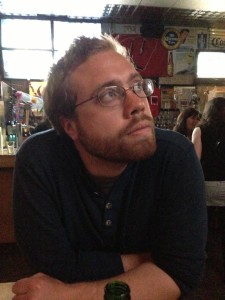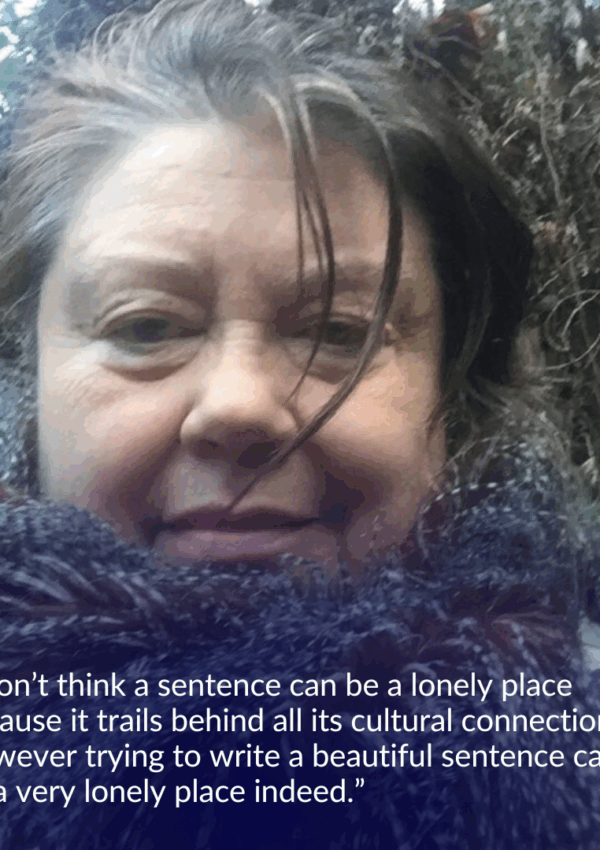At twenty-eight I have quietly, and without much explaining, maneuvered my life into a position where I can easily focus on writing. This means I currently work a slightly-better than minimum-wage service industry job with limited hours and as few demands on my brain as possible. It pays the bills and it’s meaningless enough that its minor stresses rarely carry over into my life. This seems crazy to a lot of people. Because where’s the future in this? One can’t be a poet-barista when they’re fifty right? Maybe not, but fifty also seems like too long to wait to begin my inner life, to start the work that against all logic, seems most precious to me.
Why do I live like this, so far below my economic potential, doing a job that utilizes almost none of my higher-level skills and qualifications? Well, for one, because I never went to college and have no higher-level skills and qualifications (whoops) and two, because I’m incredibly fucking happy. But of course, happiness is a frail thing.
No, the real answer is this thing I keep referring to as the “inner life.” It’s kind of a shadowy, mercurial term and I am not always even sure what I mean by it, but it seems more real the longer I focus on it, and the longer I pursue it, the more I find it at odds with what I am supposed to be doing, what our mad culture lays out as a proper life trajectory. Because our culture is mad, batshit mad (and not in a cool, artsy crazy aunt way). It’s madly extroverted, so focused on its own ugly structures of economic gain that it’s slowly burning up the world, while its citizens with no depths left around them, forget they have depths inside them. We all either become gun-happy militiamen protecting our own Astro-turfed psyches, or die of thirst in the wasteland where our gardens should have been. Writing, cultivating an inner-life, is a way to get back to the garden, and once there, of rebuilding the architecture, the structures of balance and habitation.
Joseph Campbell once pointed out that one can look at a city and know immediately what the central myth of that civilization is by its largest structure. In Ancient Rome it was the Coliseum, in Medieval Europe it was the town church or cathedral, in modern American cities it’s usually the business buildings. Here in Seattle, it’s more lateral: the sprawl of the Amazon campus, and all these tech industry buildings. By these standards, we have a bad myth, maybe not a myth at all, but in one of the most beautiful and consolatory moments in all of modern literature, that great seeker-poet Rainer Maria Rilke captured the problem with laser-precision, while offering the best invitation to the inner-life I’ve ever read.
He says:
Speak and bear witness. More than ever
the things that we might experience are vanishing,
and what crowds them out and replaces them is an imagesless act.
An act under a shell which cracks open as soon as
as the business inside outgrows it and seeks new limits.
Temples are no longer known. It is we who secretly save up
these extravagances of the heart. Where one of them still
survives,
a Thing that was formerly prayed to, worshiped, knelt
before–
just as it is, it passes into the invisible world.
Many no longer perceive it, yet miss the chance
to build it inside themselves now, with pillars and statues:
greater.
The world is still full of resonant structures, cities of the spirit that stand inside us, a collective refuge. Like most adherents of the inner life, I will probably die poor and anonymous. But someone has to maintain the grounds.
Note: Quotes from Rainer Maria Rilke’s Duino Elegies, translated by Stephen Mitchell.
 Seth Jani currently resides in Seattle, WA and is the founder of Seven CirclePress (www.sevencirclepress.com). His own work has been published widely in such places as The Coe Review, The Hamilton Stone Review, Hawai`i Pacific Review, VAYAVYA, Gingerbread House and Gravel. More about him and his work can be found at www.sethjani.com.
Seth Jani currently resides in Seattle, WA and is the founder of Seven CirclePress (www.sevencirclepress.com). His own work has been published widely in such places as The Coe Review, The Hamilton Stone Review, Hawai`i Pacific Review, VAYAVYA, Gingerbread House and Gravel. More about him and his work can be found at www.sethjani.com.
Seth’s poetry is available in Black Fox Issue 13.



